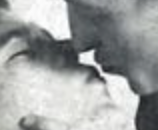This post was contributed by Dr Heike Bauer, a senior Lecturer in English Literature and Gender Studies in Birkbeck’s Department of English and Humanities. It originally appeared on her blog A Violent World of Difference.
On 13 February, to mark LGBT History Month, I organised a screening of Anders als die Andern/ Different from the Others (dir. Richard Oswald), a film about homosexual blackmail produced in collaboration with Magnus Hirschfeld who also stars in it. The event was a great success, attracting a large audience which – perhaps prompted by an unexpected fair turn in the weather – occupied almost all the seats in the Birkbeck cinema.
A quick survey revealed that the majority of people in the audience were not professional academics. This was very welcome information, for a main aim of the evening was to bring sexuality scholars into dialogue with people from a wide range of backgrounds.
To kick-start debate after the screening, three wonderful Birkbeck panellists – Silke Arnold-de Simine (European Literatures and Cultures), Justin Bengry (History) and Daniel Monk (Law) – shared their insights into the film and its contexts. Together, we discussed a wide range of topics including, for example, the relationship between law and the everyday, the somewhat surprising cultural visibility of various gender and sexual identities in the early Weimar Republic, and the similarities as well as differences between British and German sexual politics.

As the discussion opened up to the audience, two questions were asked with particular frequency albeit in a range of guises: one focused on how the historical material relates to our understanding of gender and sexuality in the twenty-first century; and the other reflected on the extent to which any approach to this past is shaped by our own personal experiences and sense of self.
In some cases, the questioner’s focus was firmly on Magnus Hirschfeld himself, reminding me that for some gay men and transgender people in particular Hirschfeld occupies an iconic position in the struggle for rights, equality and a liveable life. While I am critically suspicious of such elevations – not least because I find them hard to reconcile with the more problematic aspects of Hirschfeld’s work such as his support for eugenics – I am nevertheless interested in what one might call ‘the felt impact’ of his work: his role in the construction of affirmative imaginaries that allow nonormative existence to be conceptualised in collective terms, terms that can be, but are not necessarily, tied to political action.
Our discussion at the event showed that neither the biographical minutiae of Hirschfeld’s life nor ‘official’ narratives about sexuality, such as the ones told by law, can fully tell us what it felt like to live a queer life in the early twentieth century. But reading such narratives alongside cultural representations – such as Anders als die Andern – allows us to critique the ‘truths’ that are assigned by and about Hirschfeld across time. For, to adapt Virginia Woolf’s observation in A Room of One’s Own, such representations are ‘likely to contain more truth than fact’.
Anders als die Andern and the discussion that followed interrogated many ‘truths’ and ‘facts’ about bodies and desires. In so doing, the event also revealed the critical importance of feelings in discussions about gender and sexuality.
The next Fellowship event will be an academic symposium, Homophobia Rewritten. Click here for further details. The call for papers closes on 31 March 2014.
